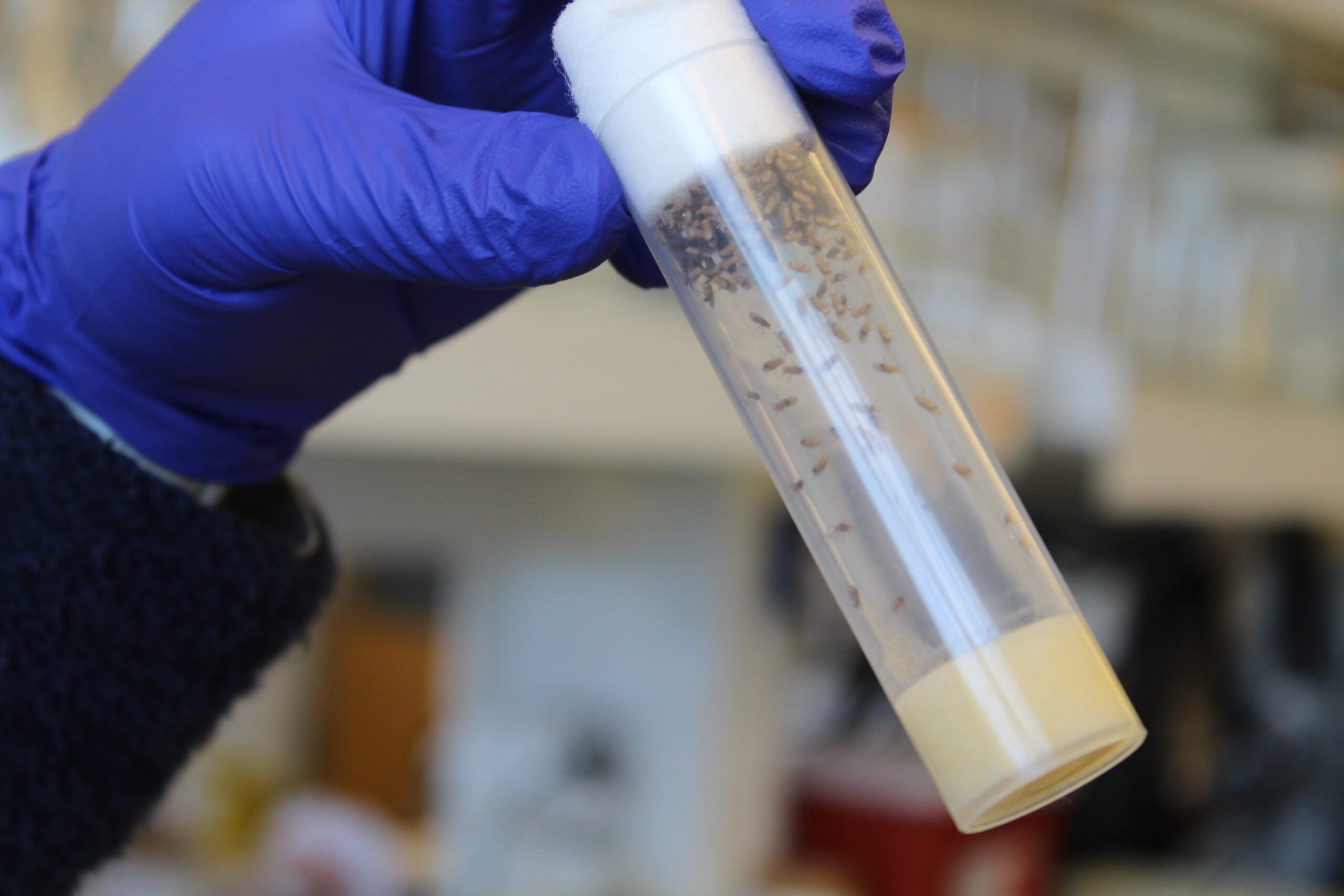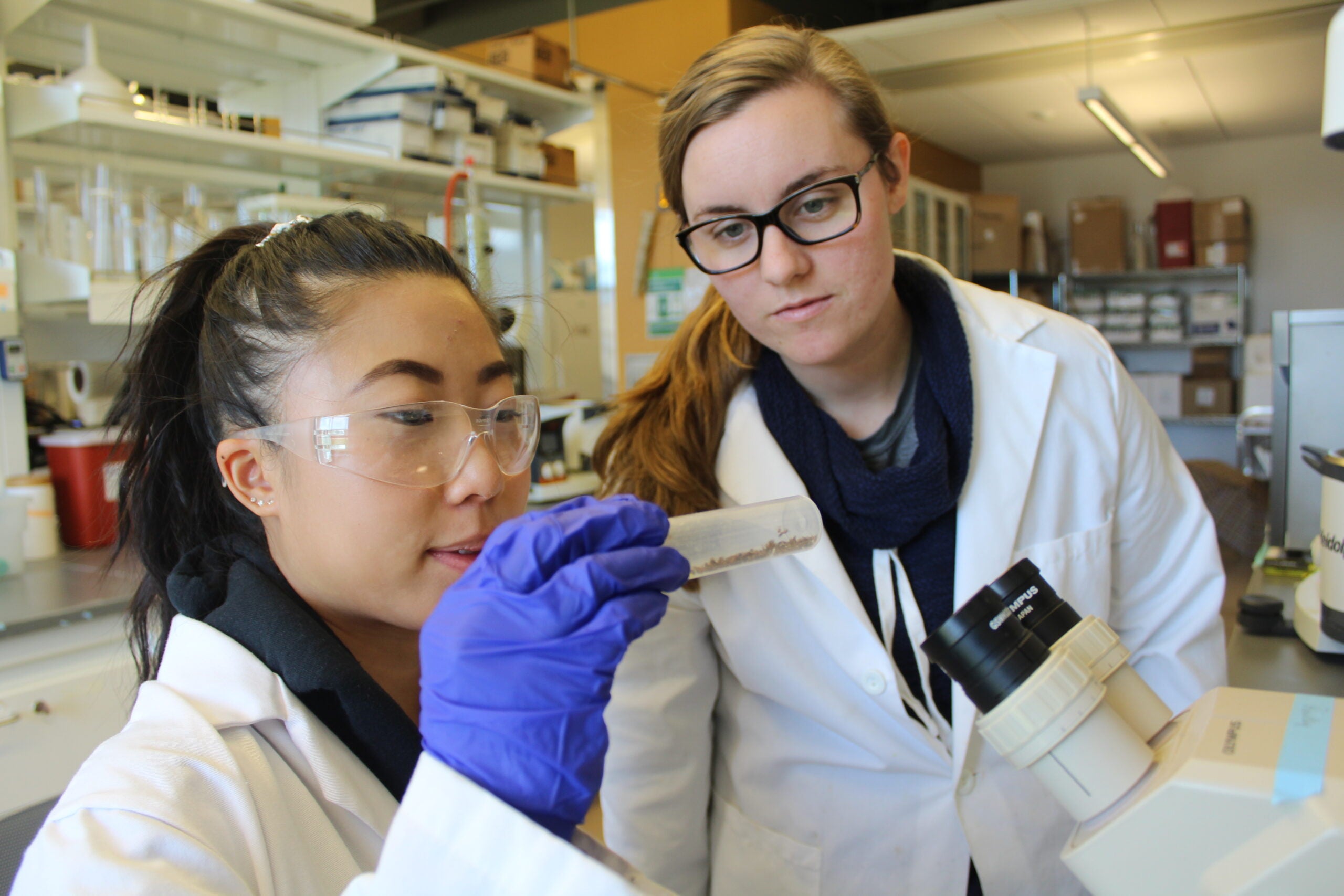KINGSTON, R.I. – December 3, 2018 – There has been considerable buzz around the Bioactive Botanical Research Laboratory in the University of Rhode Island’s College of Pharmacy lately. That’s partly because researchers there have a new ally in their quest to find a new treatment for Parkinson’s disease — the fruit fly.
Researchers — led by interdisciplinary neuroscience Ph.D. candidate Shelby Johnson and pharmacy Professor Navindra Seeram — are working with the insects to test the effectiveness of natural compounds as treatments for the neurodegenerative disease. They have been administering multiple compounds to the flies — which have Parkinson’s through either genetic modification or exposure to toxins — including Equol, a gut microbial metabolite of certain isoflavones found in soybeans, which are known to act as plant-based estrogens.
“In Parkinson’s, males have a higher incidence rate than females, and women have a higher chance of being diagnosed after menopause,” Johnson said. “So, there’s this hypothesis of estrogen being protective, which drove us to look into plant-based estrogens.”
Other compounds that could become treatments include a maple syrup extract, which Seeram has researched extensively to treat a host of ailments; and an extract from the seeds of the Mucuna pruriens, a tropical legume, which is a natural source of L-dopa and has been used for thousands of years in Ayurveda, a form of traditional medicine originating from the Indian subcontinent.
“We have also looked at certain key inflammatory biomarkers in the fly brains,” Johnson said. “While the transgenic and toxin-induced models had increased inflammation, treating with the natural products reduced these biomarkers.”
 One method of testing a compound’s effectiveness in treating Parkinson’s is called negative geotaxis, a common technique used in fruit fly research. It involves tapping a tube containing the flies so they fall to the bottom, and then counting how many of the flies have climbed up past the halfway line on the tube at different time intervals. This is especially relevant to Parkinson’s testing because it measures the flies’ mobility after being given a natural compound.
One method of testing a compound’s effectiveness in treating Parkinson’s is called negative geotaxis, a common technique used in fruit fly research. It involves tapping a tube containing the flies so they fall to the bottom, and then counting how many of the flies have climbed up past the halfway line on the tube at different time intervals. This is especially relevant to Parkinson’s testing because it measures the flies’ mobility after being given a natural compound.
There is still much to learn from the on-going study, but preliminary results of the tests have been promising. Flies with toxin-induced Parkinson’s given the Mucuna pruriens seed extract have demonstrated increased climbing ability. Johnson published these results over the summer in the journal, Nutrients. (https://www.mdpi.com/2072-6643/10/9/1139/htm).
The next step in the study is to further analyze the effects of single compounds isolated from the extract on both toxin-induced and transgenic Parkinson’s models in the flies.
“In the future, we also plan to do a more in-depth analysis of proteins involved in these protective mechanisms,” said Johnson, noting she has a personal motivation to study Parkinson’s and help find better treatments, the subject of her dissertation. “My initial reasoning for getting into it was because I have two family members with Parkinson’s and I know about four or five family friends that have it as well.”
Founded by Seeram, who is also an affiliate faculty member of URI’s George & Anne Ryan Institute for Neuroscience, the Bioactive Botanical Research Laboratory at URI is among the foremost labs involved in plant-based medicinal research in the United States. Seeram, who has extensively researched the medicinal properties of plants, has notably discovered the potential for maple leaf extract to be used as natural treatments for such ailments as diabetes and Alzheimer’s, as well as natural skin health and beauty applications. The lab’s work aims to boost the local maple market, increasing sales by as much as $20 million a year. (https://web.uri.edu/maple/maplepromotion/)
The College of Pharmacy is part of the URI Academic Health Collaborative, which also includes the Colleges of Health Sciences and Nursing.

